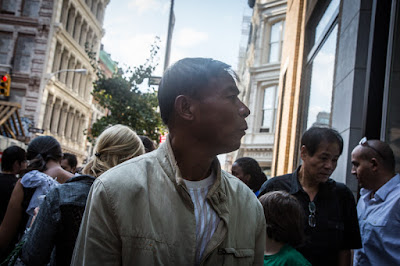I become more and more fascinated with William Eggleston. I new his color work long, long ago. I have to admit it--I wasn't a fan. Color film was so unreal and unpredictable. I hated the Ilfochrome prints made from color slides. They were plastic looking and shiny. But I've come around. I think it is due in large part to my fascination with Eggleston himself. He is such a throwback, southern gentility in the most Faulknerian sense, embodying all the sin and madness of the corrupt generations that took the land from those already there, who worked the land with slaves, who built a beautiful dream on a bedrock of violence and greed.
O.K. Maybe I've gone too far. Maybe Eggleston reminds me of Tennessee Williams, though there was something lighter and more beatific in Williams' personality. I'd like to meet Eggleston, I think.
I began watching a video Eggleston made in 1973 using a Sony PortaPak (I think this is the same camera Bob Crane used to make early sex tapes). It is bizarre and reminds me of something William S. Burroughs might have made with the beats. Here is the link.
I also watched a brief interview with his daughter that is fascinating in its own way (link).
The most interesting thing I learned yesterday is that Eggleston, the father of color fine arts photography, is colorblind. Perfect.
Here is part of an interview he did with Interview magazine around ten years ago (link). There is also a very short piece on him in this last December's edition of Vanity Fair from the bar at the Chelsea Hotel where he was reportedly drinking hand over fist. So. . . this is, as my friend called it, the cautionary tale that caught my interest.
HK: Do you have any favorite bars?
WE: No, I have some that I have become a well-known-even infamous-client of, mostly in Memphis. But a great deal of that is legend and doesn't have anything to do with truth. Many people one meets in life somehow think they know you simply because they're hanging out at the same counter-but they really don't know a thing about you.
HK: Do you have friends that you used to just drink with or hang out with, like, from the '60s or '70s-from the early days?
WE: Unfortunately they're practically all dead. And many were my closest associates: friends, co-directors, whatever you want to say-my partners in crime.
HK: A lot of them died from drinking?
WE: Some, yes. A person can attack that bottle of vodka and drink it like it's a bottle of cold water. Two of my wife's girlfriends died from drinking. They weren't big pill-takers; they were drinkers. So it can't be so simple as to slide away, like Marilyn Monroe-
HK: They overdosed?
WE: Overdone something.
HK: Do you hang out at bars as much now?
WE: Hardly at all. Remember, all my friends are dead. I don't have anybody to meet up with. [laughs]
HK: You outlived them all.
WE: I certainly have.
HK: And why do you think that is? Just genetics?
WE: I think genetics. My mom lived to be pretty old and my grandmother lived to be 100 and ate like a bird. I eat like a bird almost.
HK: Have you ever tried psychotherapy?
WE: Only the few times I've been to so-called treatment centers, which were a complete waste of money and useless. I didn't know what I was doing at the time, because I was always drunk when I checked in.
HK: Did you check in voluntarily?
WE: Half voluntarily, half Winston's older brother [William] would take me in, saying, "Daddy, I think you oughta do this." And I'd say, "I think you're right, maybe I do need it." Sometimes a week later I'd leave the place; sometimes I'd stick it out for a month.
HK: Did you have tough detoxes?
WE: No. Never. I never hallucinated during my d.t.'s. They weren't easy, but not-
And that is how the online interview ends.


No comments:
Post a Comment